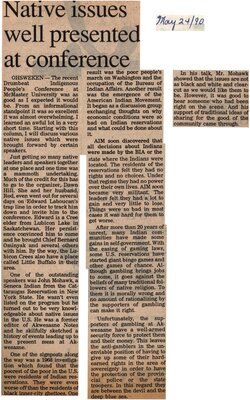"Native Issues Well Presented at Conference"
- Full Text
- Native issues well presented at conference
OHSWEKEN - The recent Drumbeat Indigenous People's Conference at McMaster University was as good as I expected it would be. From an informational standpoint it was so excellent it was almost overwhelming. I learned an awful lot in a very short time. Starting with this column, I will discuss various native issues which were brought forward by certain speakers.
Just getting so many native leaders and speakers together at one place and one time was a mammoth undertaking. Much of the credit for this has to go to the organizer, Dawn Hill. She and her husband, Rod, even went out for several days on Edward Laboucan's trap line in order to track him down and invite him to the conference. Edward is a Cree elder from Lubicon Lake in Saskatchewan. Her persistence convinced him to come and he brought Chief Bernard Ominyak and several others with him. By the way, the Lubicon Crees also have a place called Little Buffalo in their area.
One of the outstanding speakers was John Mohawk, a Seneca Indian from the Cattaraugas Reservation in New York State. He wasn't even listed on the program but he turned out to be very knowledgeable about native issues in the U.S. He was a former editor of Akwesasne Notes and he skilfully sketched a history of events leading up to the present mess at Akwesasne.
One of the signposts along the way was a 1968 investigation which found that the poorest of the poor in the U.S. were residents of Indian reservations. They were even worse off than the residents of black inner-city ghettoes. One results was the poor people's march on Washington and the occupation of the Bureau of Indian Affairs. Another result was the emergence of the American Indian Movement. It began as a discussion group exchanging thoughts on why economic conditions were so bad on Indian reservations and what could be done about it.
ATM soon discovered that all decisions about Indians were made by the BIA or the state where the Indians were located. The residents of the reservations felt they had no rights and no choices. Under that regime they had no power over their own lives. AIM soon became very militant. The leaders felt they had a lot to gain and very little to lose. Things were so bad in most cases it was hard for them to get worse.
After more than 20 years of unrest, many Indian communities have made some gains in self-government. With the easing of gaming laws, some U.S. reservations have started giant bingo games and other games of chance. Although gambling brings jobs to some, it goes against the beliefs of many traditional followers of native religion. To them it is morally wrong and no amount of rationalizing by the supporters of gambling can make it right.
Unfortunately, the supporters of gambling at Akwesasne have a well-armed security force to protect them and their money. This leaves the anti-gamblers in the unenviable position of having to give up some of their hard-earned rights in the area of sovereignty in order to have the protection of the provincial police or the state troopers. In this regard they are between the devil and the deep blue sea.
In his talk, Mr. Mohawk showed that the issues are not as black and white and clearcut as we would like them to be. However, it was good to hear someone who had been right on the scene. And his support of traditional ideas of sharing for the good of the community came through.
- Mystery Question
- Who is the author of this article?[Please answer by clicking on the Comments tab]
- Media Type
- Newspaper
- Item Types
- Articles
- Clippings
- Description
- "The recent Drumbeat Indigenous People's Conference at McMaster University was as good as I expected it would be. From an informational standpoint it was so excellent it was almost overwhelming. I learned an awful lot in a very short time. Staring with this column, I will discuss various native issues which were brought forward by certain speakers."
- Date of Original
- Spring 1990
- Subject(s)
- Personal Name(s)
- Hill, Dawn ; Hill, Rod ; Laboucan, Edward ; Ominyak, Bernard ; Mohawk, John.
- Corporate Name(s)
- McMaster University ; Bureau of Indian Affairs.
- Local identifier
- SNPL002766v00d
- Collection
- Scrapbook #2
- Language of Item
- English
- Creative Commons licence
 [more details]
[more details]- Copyright Statement
- Public domain: Copyright has expired according to Canadian law. No restrictions on use.
- Copyright Date
- 1990
- Contact
- Six Nations Public LibraryEmail:info@snpl.ca
Website:
Agency street/mail address:1679 Chiefswood Rd
PO Box 149
Ohsweken, ON N0A 1M0
519-445-2954



